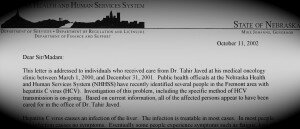After a thorough investigation by health officials, 50 of these patient notifications have become confirmed outbreaks of bloodborne pathogens, usually hepatitis C.
Hepatitis C is a life-threatening disease. Some patients are able to be rid of the virus without treatment, but many others have to go through treatment, which can be excruciating, debilitating. Treatment options are changing and are becoming easier to tolerate and more effective. However, the cost of treatment is very high and many insurance companies are refusing to pay $1,000 a pill for the months of treatment.
Patient notification events are challenging for everyone involved. The patient who receives a letter from the healthcare system or health department is often confused and scared. The community itself is affected. No one wants to think the healthcare delivered down the street is deficient. Especially shocking for many people is the violation of basic injection safety principles.
Since we have dedicated our lives to preventing outbreaks from unsafe injections, these notifications disappoint us. But we take heart in that over time, we are seeing that healthcare providers are alerting others to their observations of unsafe injection practices, resulting in a notification campaign. We thank these brave healthcare providers from the bottom of our hearts. They are saving lives.
HONOReform and our colleagues in the Safe Injection Practices Coalition are beginning to examine the components of the patient notification process – the letter to patients, the information that is placed online, the process itself. We think the patient notification process can, and should, be improved, sped up, personalized, humanized.
For example, HONOReform representatives recently traveled to a site where a patient notification occurred and met with patients, public health officials and community representatives. We found that notification letters had only been sent to letters “C-D” in the alphabet. Most of the affected patients had only gained information about their exposure through various news report. We urged health officials to redouble their efforts to inform the patients. We continue to do so.
Back to the three patient notifications announced this week–in Vancouver, Washington, Manchester, New Hampshire and Derby, Connecticut.
If we move aside the “This should never happen” part for a minute, and take a look at the process itself, there is a lot to recommend about the approach in Vancouver, Manchester and Derby.
Here is some information being provided to patients in these areas:
The statement in Vancouver includes an “apology” (quite rare, in our experience) to the patients:
http://www.peacehealth.org/hepc/Pages/default.aspx
A dental office in Manchester is being investigated. Here is the information on the New Hampshire Department of Health and Human Services website:
http://www.dhhs.nh.gov/dphs/cdcs/investigations/marshall.htm
The misuse in Derby was discovered during a routine “safety huddle,” after a nurse questioned a pharmacist about whether the insulin pens could be used on more than one patient:
Our goal at HONOReform is to safeguard the medical injection process, which includes our desire to provide safeguards even after the process has been violated.
There is so much more that can be done to help patients and their loved ones and the entire community, including the healthcare community, during the patient notification process. We are currently discussing expanding the patient notification process with colleagues and experts, and we hope to present a plan to strengthen this process in the near future.
Until then, we continue to urge healthcare workers to be determined about injection safety, and patients to ask questions of their healthcare providers, during the injection process.


